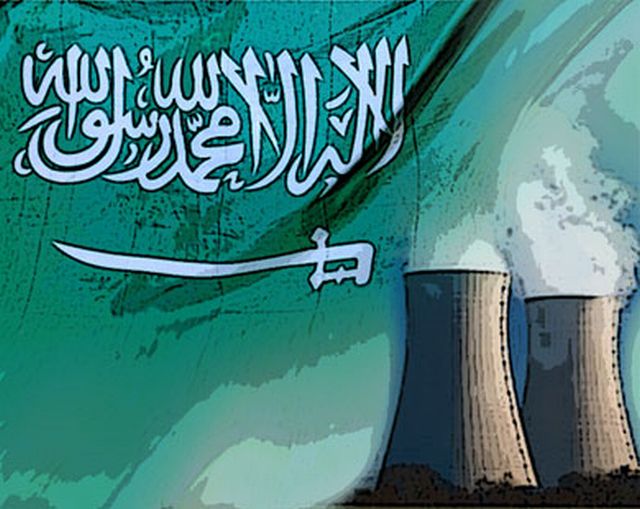Saudi Arabia’s announcement last week that it plans to build 16 nuclear reactors with a budget of more than $100 billion raises doubts about its nuclear ambitions.
These civilian reactors represent a symbolic response to Iran’s nuclear development that can also serve as a prelude to a military program in the future.
Until now, the rulers of Saudi Arabia felt secure under the American security umbrella. Still, the impact of an Iranian bomb or even worse, a “Shia bomb,” on Saudi national security may change the strategic calculations of the House of Saud. Already, questions about U.S. willingness to continue extending its support have been influencing Riyadh to reconsider its strategy. These concerns existed before America’s response to the “Arab spring,” but were intensified because of it. For example, the same week the civilian program was announced two senior Saudi princes said explicitly and publicly that a nuclear option is one the kingdom is obligated to examine, if Iran is not stopped.
The conventional assessment is that those threats are intended to pressure the U.S. to deal more forcibly with Iran and that the kingdom will eventually see itself as obligated to enter under the American nuclear umbrella. Even if the US overcomes its aversion to yet further involvement in the Middle East, Saudi Arabia might remain skeptical about America’s readiness to defend the Saudi homeland, and therefore seek to purchase, rather than build, its own nuclear deterrent. It would give the royals more freedom to maneuver and release them from patron–client patterns developed with the Americans.
Saudi Arabia understands that the United States is still the most effective protector of its national security, but should the United States put some distance between itself and the region, new players enter the arena, or a rift develop between the two nations, Saudi Arabia is most likely to alter its position.
Saudi Arabia is the number one candidate for further proliferation in the Middle East. It has both the strategic motivation and financial capability to strive for the nuclear option. The option of purchasing a nuclear weapon would also to a large extent “immunize” the Kingdom against a preventive strike at its nuclear installations, simply because they would not exist.
The expansion of Pakistan’s nuclear program in recent years was first and foremost designed to counter India’s growing nuclear might. However, the fact remains that Pakistan is dramatically expanding its nuclear program – it is the fastest growing nuclear arsenal in the world – and this might be worrisome from the point of view of proliferation. As a leading Arab state and as Iran’s ideological-religious rival and main competitor for regional influence, Saudi Arabia will find it difficult to sit quietly should Iran obtain military nuclear capability.
Therefore, one cannot rule out the positioning of Pakistani nuclear weapons, under Pakistani control, on Saudi soil. It was the Saudis that paid for the Pakistani bomb and the moment to “cash their investment” is getting closer. Indeed, out of fear of the stability of the Saudi kingdom, Pakistan recently placed some of its forces on alert to be sent to Saudi Arabia if security there deteriorates.
Do the Saudis have a viable alternative to relying exclusively on an American defence umbrella? In practice, they rarely put all their eggs in one basket. If Riyadh views its essential security interests threatened, it may prefer to engage in a series of even contradictory steps to ensure its security. Given its enormous wealth and military weakness, it is a safe bet that Saudi Arabia will invest in multiple security arrangements that help guarantee the continuity of the regime.
If Saudi Arabia decides to pursue the nuclear path, it would likely purchase “off the shelf” technology. Since the beginning of the nuclear age, there is no precedent of any country selling or transferring nuclear warheads to another. Nevertheless there is a precedent for the distribution of nuclear knowledge and equipment, Pakistan.
Riyadh, like Tehran, may conclude that its security constraints as well as the attendant prestige and influence generated by the bomb outweigh the political and economic costs it is paying and will continue to pay. As Iran approaches the nuclear threshold there will be increased pressure on Pakistan to meet its obligations to Saudi Arabia in the field. That may result in Saudi Arabia becoming the first country to enter the nuclear club by simply purchasing a functional weapon. Fear that in certain scenarios the Kingdom might find itself coping alone with a nuclear Iran, and the consequences of this to its status and security, may lead Saudi Arabia to want to keep all the options, including the controversial nuclear option, open.
Yoel Guzansky is a research fellow at the Institute for National Security Studies (INSS) Tel Aviv University, and a former member of Israel’s National Security Council.
Image: saudinuclear.jpg
